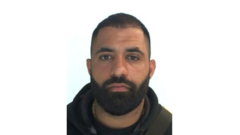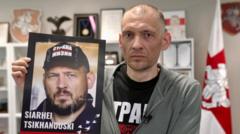Mark Lowen, a BBC correspondent, details his unexpected detention and deportation from Turkey after covering major protests, highlighting the challenges faced by journalists and the broader implications for democracy in the country.
BBC Correspondent Detained and Deported from Turkey Amidst Protests

BBC Correspondent Detained and Deported from Turkey Amidst Protests
Mark Lowen recounts his experience of being detained in Istanbul while covering the anti-government protests, shedding light on Turkey's ongoing struggle for democracy.
I had just sent a message to my family expressing my joy at being back in Turkey, a place I once called home, when I received an urgent call from the hotel receptionist asking me to come downstairs. Upon arrival, I was met by three plain-clothes policemen who requested my passport and subsequently took me into custody while attempting to prevent my colleagues from recording the event. My trip to Istanbul had lasted three days, during which I was reporting on the anti-government protests sparked by the arrest of the mayor, Ekrem Imamoglu.
I was first brought to police headquarters, where I was detained for seven hours. The atmosphere remained relatively civil, with a few police officers expressing dissent about the state's actions, even a couple offering gestures of support. However, at 9:30 PM, I was transferred to the foreigners' custody unit, where conditions quickly changed. The officers chain-smoked around me, and my attempts at communicating in broken Turkish felt increasingly strained. I was fingerprinted and denied access to lawyers or any external communication.
In the early hours, I was presented with deportation paperwork claiming my presence was a "threat to public order," a justification I found lacking as they provided no explanation for this decision. One officer even suggested I film a statement claiming that I was leaving voluntarily, hinting it might help me return in the future, but I declined, wary of the possible manipulation of the footage.
As dawn approached, I was moved to a final holding area at the airport. There, with constant interruptions from officers and the din of daily activity, sleep eluded me. Seventeen hours after my initial detention, I was put on a flight back to London. Following my deportation, the Turkish government released a statement claiming my lack of proper accreditation was the basis for my removal, a reason they had neglected to mention during my detention.
Fortunately, I never faced mistreatment during this ordeal, and I recognized that the BBC, along with the British Consulate in Istanbul, was actively working for my release. However, I am aware that many who encounter the Turkish authorities lack similar support. During my prior tenure as Istanbul correspondent from 2014 to 2019, Turkey had already earned a reputation as the world's leading jailer of journalists, and the current Press Freedom Index underscores this troubling reality by ranking Turkey 158th out of 180 countries.
The protests, which initially focused on Imamoglu's arrest, have transcended into a broader demand for democratic freedoms in a country increasingly embracing authoritarianism. As the Turkish government continues to tighten its grip on the media and dissent, I witnessed a moment of this struggle up close. It is a bittersweet reflection, knowing that while I am back home, many others face much harsher realities.
President Recep Tayyip Erdogan has dismissed the protests as "street terrorism," feeling bolstered by the international climate and Turkey's strategic importance. The critical question remains: will the wave of protests maintain its momentum or will Erdogan quell this significant opposition as he has done in the past? Regardless of the chants echoing throughout the streets, one should not underestimate Erdogan’s resolve.





















